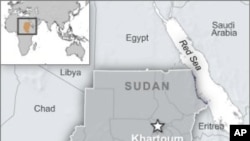North and south Sudan have agreed to set up a joint security mechanism to manage tensions along their disputed frontier once the country splits into two in July. The deal establishes a demilitarized zone to be jointly monitored under international supervision. Ethiopia is offering to send peacekeepers to act as a buffer between opposing forces.
Senior northern and southern military commanders signed the accord late Monday after three days of talks at an Addis Ababa hotel.
The deal, brokered by former South African President Thabo Mbeki’s African Union panel on Sudan, sets up a high-level mechanism through which senior officials from both sides will meet regularly to discuss security issues.
AU Panel adviser Alex de Waal says the coordination mechanism is one of two significant items in the agreement aimed at ensuring the long-term future of north-south Sudan relations.
"Perhaps more importantly, it sets up a common border zone," De Wall said. "Ten kilometers on each side of the border is to be demilitarized across the entire 2,175-kilometer length of the North-South border. There is to be this 20-kilometer-broad demilitarized zone to be monitored jointly by the parties, and this is to be established by the 9th of July."
Diplomats close to the Addis Ababa talks say Ethiopia has offered to send a contingent of troops to act as a buffer between northern and southern units in monitoring the demilitarized zone. The United Nations Security Council is said to be considering a plan in which the Ethiopians would become a full-fledged U.N. Peacekeeping unit.
Ethiopian foreign ministry spokesman Dina Mufti told VOA by telephone that any decision to send peacekeepers would only be considered if both north and south Sudan request their presence.
"Ethiopia is determined to see that things go well for north and south Sudanese and peace and stability can prevail in the region," Dina Mufti said. "If both sides request the presence of Ethiopian help, Ethiopia would consider to help them. As long as they seek for it, it can be considered."
The immediate issue, however, is the flareup of tensions in recent days in the bitterly contested Abyei region. Northern troops seized Abyei’s largest town in a lightning offensive last week, forcing an estimated 60,000 southerners to flee their homes.
AU panel adviser De Waal, who facilitated the north-south security talks, says the agreement signed in Addis Ababa Monday outlines a strategy for easing tensions by returning Abyei to normal before the south’s Independence Day.
"The question of the security and administrative status of Abyei in the immediate term, that needs to be resolved very quickly," De Wall said. "And what this agreement does is set up the framework in which Abyei can be demilitarized, in which military forces could be withdrawn, and in which some sort of interim administration could be created."
De Waal says the Addis Ababa talks are scheduled to resume later in the week, after the UN Security Council meets in New York, and after further discussions in Khartoum and in the southern capital, Juba.
The Mbeki Panel adviser says the month of June will be consumed by negotiations on other sensitive questions, such as how to split the revenue from oil produced in Abyei, and how to settle Sudan’s $38 billion foreign debt. He held out hope that, in the current atmosphere of negotiation, the final status of Abyei might be settled before July 9.
North-South Sudan Agree on Demilitarized Zone Along Border




